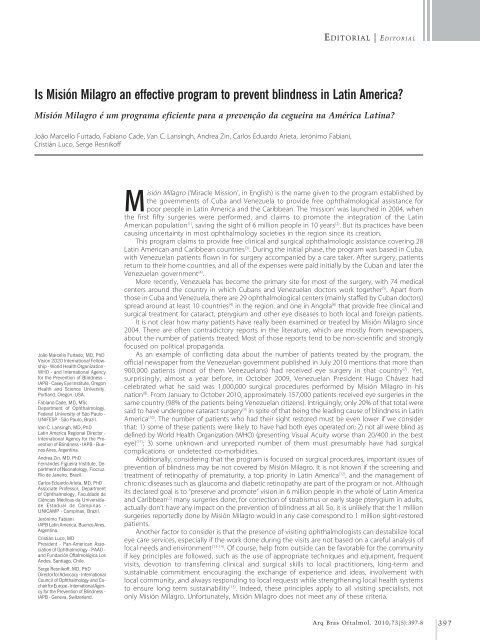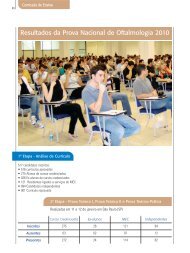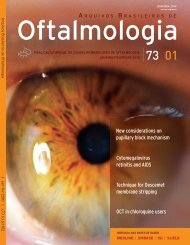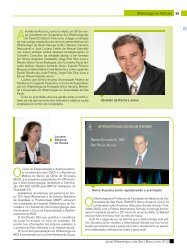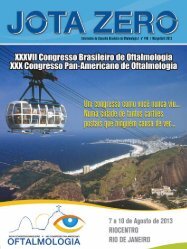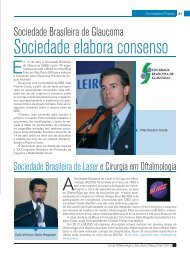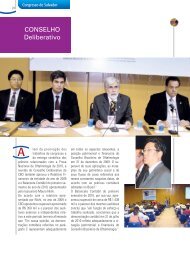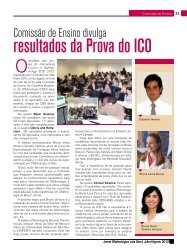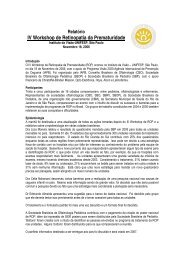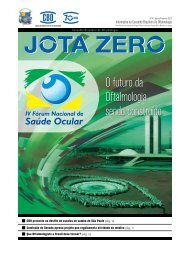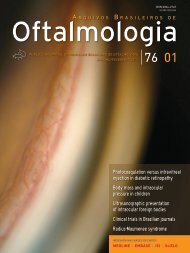Monovision and cataract surgery Visual field and OCT correlation ...
Monovision and cataract surgery Visual field and OCT correlation ...
Monovision and cataract surgery Visual field and OCT correlation ...
You also want an ePaper? Increase the reach of your titles
YUMPU automatically turns print PDFs into web optimized ePapers that Google loves.
EDITORIAL | EDITORIAL<br />
Is Misión Milagro an effective program to prevent blindness in Latin America?<br />
Misión Milagro é um programa eficiente para a prevençâo da cegueira na América Latina?<br />
João Marcello Furtado, Fabiano Cade, Van C. Lansingh, Andrea Zin, Carlos Eduardo Arieta, Jerónimo Fabiani,<br />
Cristián Luco, Serge Resnikoff<br />
João Marcello Furtado, MD, PhD<br />
Vision 2020 International Fellowship<br />
- World Health Organization -<br />
WHO - <strong>and</strong> International Agency<br />
for the Prevention of Blindness -<br />
IAPB - Casey Eye Institute, Oregon<br />
Health <strong>and</strong> Science University.<br />
Portl<strong>and</strong>, Oregon, USA.<br />
Fabiano Cade, MD, MSc<br />
Department of Ophthalmology,<br />
Federal University of São Paulo -<br />
UNIFESP - São Paulo, Brazil.<br />
Van C. Lansingh, MD, PhD<br />
Latin America Regional Director -<br />
International Agency for the Prevention<br />
of Blindness - IAPB - Buenos<br />
Aires, Argentina.<br />
Andrea Zin, MD, PhD<br />
Fern<strong>and</strong>es Figueira Institute, Department<br />
of Neonatology, Fiocruz.<br />
Rio de Janeiro, Brazil.<br />
Carlos Eduardo Arieta, MD, PhD<br />
Associate Professor, Department<br />
of Ophthalmology, Faculdade de<br />
Ciências Médicas da Universidade<br />
Estadual de Campinas -<br />
UNICAMP - Campinas, Brazil.<br />
Jerónimo Fabiani<br />
IAPB Latin America, Buenos Aires,<br />
Argentina.<br />
Cristián Luco, MD<br />
President - Pan-American Association<br />
of Ophthalmology - PAAO -<br />
<strong>and</strong> Fundación Oftalmológica Los<br />
Andes. Santiago, Chile.<br />
Serge Resnikoff, MD, PhD<br />
Director for Advocacy - International<br />
Council of Ophthalmology <strong>and</strong> Cochair<br />
for Europe - International Agency<br />
for the Prevention of Blindness -<br />
IAPB - Geneva, Switzerl<strong>and</strong>.<br />
Misión Milagro (‘Miracle Mission’, in English) is the name given to the program established by<br />
the governments of Cuba <strong>and</strong> Venezuela to provide free ophthalmological assistance for<br />
poor people in Latin America <strong>and</strong> the Caribbean. The ‘mission’ was launched in 2004, when<br />
the first fifty surgeries were performed, <strong>and</strong> claims to promote the integration of the Latin<br />
American population (1) , saving the sight of 6 million people in 10 years (2) . But its practices have been<br />
causing uncertainty in most ophthalmology societies in the region since its creation.<br />
This program claims to provide free clinical <strong>and</strong> surgical ophthalmologic assistance covering 28<br />
Latin American <strong>and</strong> Caribbean countries (3) . During the initial phase, the program was based in Cuba,<br />
with Venezuelan patients flown in for <strong>surgery</strong> accompanied by a care taker. After <strong>surgery</strong>, patients<br />
return to their home countries, <strong>and</strong> all of the expenses were paid initially by the Cuban <strong>and</strong> later the<br />
Venezuelan government (4) .<br />
More recently, Venezuela has become the primary site for most of the <strong>surgery</strong>, with 74 medical<br />
centers around the country in which Cubans <strong>and</strong> Venezuelan doctors work together (5) . Apart from<br />
those in Cuba <strong>and</strong> Venezuela, there are 29 ophthalmological centers (mainly staffed by Cuban doctors)<br />
spread around at least 10 countries (4) in the region, <strong>and</strong> one in Angola (6) that provide free clinical <strong>and</strong><br />
surgical treatment for <strong>cataract</strong>, pterygium <strong>and</strong> other eye diseases to both local <strong>and</strong> foreign patients.<br />
It is not clear how many patients have really been examined or treated by Misión Milagro since<br />
2004. There are often contradictory reports in the literature, which are mostly from newspapers,<br />
about the number of patients treated. Most of those reports tend to be non-scientific <strong>and</strong> strongly<br />
focused on political propag<strong>and</strong>a.<br />
As an example of conflicting data about the number of patients treated by the program, the<br />
official newspaper from the Venezuelan government published in July 2010 mentions that more than<br />
900,000 patients (most of them Venezuelans) had received eye <strong>surgery</strong> in that country (7) . Yet,<br />
surprisingly, almost a year before, in October 2009, Venezuelan President Hugo Chávez had<br />
celebrated what he said was 1,000,000 surgical procedures performed by Misión Milagro in his<br />
nation (8) . From January to October 2010, approximately 157,000 patients received eye surgeries in the<br />
same country (98% of the patients being Venezuelan citizens). Intriguingly, only 20% of that total were<br />
said to have undergone <strong>cataract</strong> <strong>surgery</strong> (9) in spite of that being the leading cause of blindness in Latin<br />
America (10) . The number of patients who had their sight restored must be even lower if we consider<br />
that: 1) some of these patients were likely to have had both eyes operated on; 2) not all were blind as<br />
defined by World Health Organization (WHO) (presenting <strong>Visual</strong> Acuity worse than 20/400 in the best<br />
eye) (11) ; 3) some unknown <strong>and</strong> unreported number of them must presumably have had surgical<br />
complications or undetected co-morbidities.<br />
Additionally, considering that the program is focused on surgical procedures, important issues of<br />
prevention of blindness may be not covered by Misión Milagro. It is not known if the screening <strong>and</strong><br />
treatment of retinopathy of prematurity, a top priority in Latin America (12) , <strong>and</strong> the management of<br />
chronic diseases such as glaucoma <strong>and</strong> diabetic retinopathy are part of the program or not. Although<br />
its declared goal is to “preserve <strong>and</strong> promote” vision in 6 million people in the whole of Latin America<br />
<strong>and</strong> Caribbean (2) many surgeries done, for correction of strabismus or early stage pterygium in adults,<br />
actually don’t have any impact on the prevention of blindness at all. So, it is unlikely that the 1 million<br />
surgeries reportedly done by Misión Milagro would in any case correspond to 1 million sight-restored<br />
patients.<br />
Another factor to consider is that the presence of visiting ophthalmologists can destabilize local<br />
eye care services, especially if the work done during the visits are not based on a careful analysis of<br />
local needs <strong>and</strong> environment (13-14) . Of course, help from outside can be favorable for the community<br />
if key principles are followed, such as the use of appropriate techniques <strong>and</strong> equipment, frequent<br />
visits, devotion to transferring clinical <strong>and</strong> surgical skills to local practitioners, long-term <strong>and</strong><br />
sustainable commitment encouraging the exchange of experience <strong>and</strong> ideas, involvement with<br />
local community, <strong>and</strong> always responding to local requests while strengthening local health systems<br />
to ensure long term sustainability (13) . Indeed, these principles apply to all visiting specialists, not<br />
only Misión Milagro. Unfortunately, Misión Milagro does not meet any of these criteria.<br />
Arq Bras Oftalmol. 2010;73(5):397-8 397


